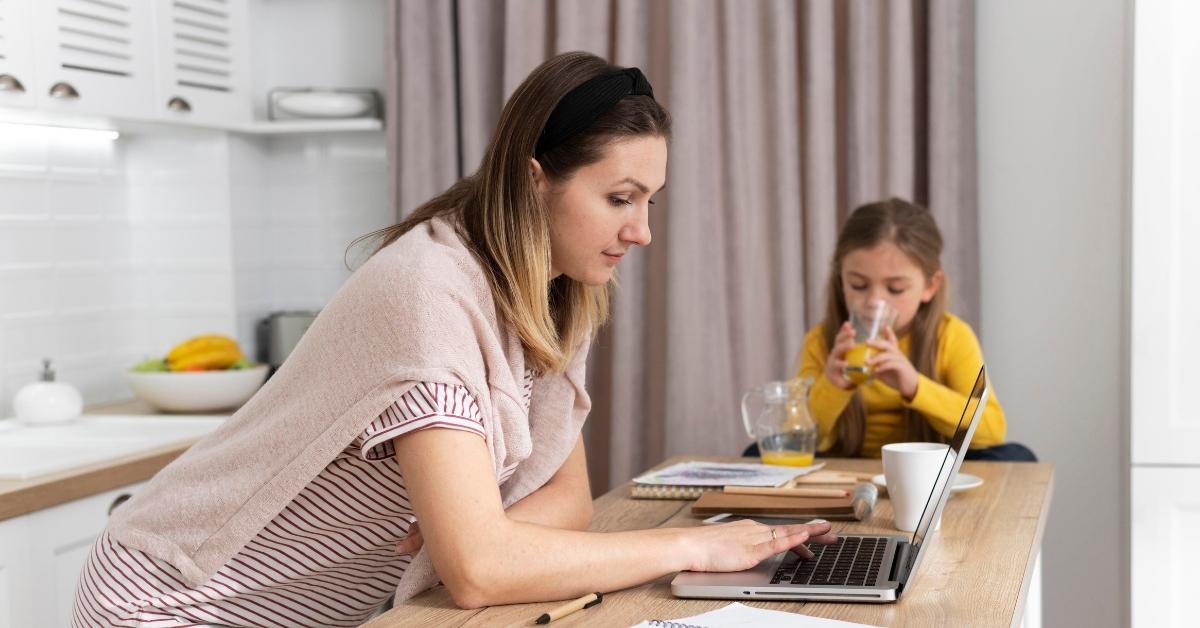In this article:
- 6 Tips to Help you Adapt as a Parent Working from Home.
- Tip 1: Keep your usual work and kid routines as much as possible.
- Tip 2: Create a daily schedule for yourself and your kids.
- Tip 3: Be precise with work about expectations, your outputs/deliverables, and when you’re best available for calls and virtual meetings.
- Tip 4: Don’t be afraid to ask for help.
- Tip 5: Give yourself a break.
- Tip 6: A few additional tips.
Many of us have jobs have jobs that are stressful enough without the additional responsibility of childcare. Unfortunately, we are living through an extraordinary event in history, which requires all of us to come together as a family and community. While the number of people working from home before COVID-19 was already at an all-time high, the demands placed on families by the pandemic is unlike any global experience in recent history. Below are 6 tips to help you adapt to your new role as a parent working from home.
In this article:
- 6 Tips to Help you Adapt as a Parent Working from Home.
- Tip 1: Keep your usual work and kid routines as much as possible.
- Tip 2: Create a daily schedule for yourself and your kids.
- Tip 3: Be precise with work about expectations, your outputs/deliverables, and when you’re best available for calls and virtual meetings.
- Tip 4: Don’t be afraid to ask for help.
- Tip 5: Give yourself a break.
- Tip 6: A few additional tips.
6 Tips to Help you Adapt as a Parent Working from Home.
Tip 1: Keep your usual work and kid routines as much as possible.
Working from home is a difficult adjustment for you and the kids. To help everyone adjust, experts agree, the first tip is to keep everyone’s routine as close to normal as possible. For us, our morning and evening routines aren’t that much different than before COVID-19. My daughter and I wake up at the same time, get dressed, brush the teeth, make and eat breakfast. In the evening, my wife and I take turns going through our usual evening routine.
While sleeping late and working in your pajamas sounds awesome, studies show that for most people, it’s more challenging to start your day and maintain your productivity when you change your regular routine. Like our kids, adults also need and thrive in a structured environment. While your family’s routine will undoubtedly change, the best advice is to maintain as much of your regular, everyday routine as possible.
Tip 2: Create a daily schedule for yourself and your kids.
While we want to include as many of our everyday routines into our new working-from-home-parent life as possible, the obvious challenge begins in creating structure between the time when the kids normally leave for school and when the parents return home. To create structure for both parents and kids, another tip I recommend is to create not one, but two schedules. A schedule for the kids and a schedule for the parents.
Collaborate on a daily schedule for the kids.
If your kids are old enough, give them a role in crafting their daily schedule. Not only will they help you think through potential activities to include, they are more likely to follow the schedule if they’ve helped create it. Here are a few activities on our home program to help get you started:
- The basics. Get dressed, brush teeth, comb hair.
- Cooking & mealtimes. Consider cooking some of your meals together. It’s a great way to spend time together. And later, after cooking together, when you need to concentrate on your work, they don’t feel as isolated.
- Potential prime time work for you.
- Free playtime. Another potential primetime work slot for you.
- Focus on what the school is providing first. Then, check online for additional workbooks, activity sheets, and kits for the kids to do.
- Screen time. When it comes to screen time, in our house, we distinguish between educational and open screen time. For educational screen time I suggest you check out online reviews, talk to other parents what they like, and ask your child’s teacher, to find out what kind of apps they might be using in the classroom. Each day there are a couple of blocks of time when our daughter can choose to play one of the educational apps on her tablet.
Each day after lunch, our daughter also has a small block of time when one of her choices is open screen time. While we monitor the content and the length of time, usually 15 minutes, we give her parent-approved options to choose from. A common example is music videos: our daughter loves Taylor Swift and Katy Perry.
Also, if you have older kids who are gamers, consider allowing time during the day to play and connect with their friends. We can’t forget that our kids are cut off socially during the pandemic, and while we all want to limit our kids access to social media and gaming, like it or not, this is one way kids can hang out socially without anyone being at risk of getting sick.
I understand screen time can be a complicated, controversial, and passionate topic to bring up with parents. I respect every parent’s right to decide for themselves how much, if any, screen time they provide their kids.
- Outside playtime. If it’s safe, and you’re not breaking any quarantine laws, let them play, exercise, blow off some steam, and absorb a dose of Vitamin D.
- Skype visits with friends and grandparents. We are all feeling isolated. Set aside a period of time during the day for the kids to connect with their friends and family members.
- Afternoon activities. Piano, ballet, gymnastics, these are three of our daughter’s activities that she can practice on some level at home. Basically, whatever afternoon activities your kid participates in, see if you can incorporate practice time or some variation at home
Create a daily home schedule for yourself.
Based on your kid’s daily schedule, identify those times during the day you can focus on getting if not most, a good chunk of your work done. For example, you might recognize that from noon to 3:00 PM, when the kids are eating lunch, playing outside, and then taking a nap, as a suitable block of time for answering emails or scheduling skype calls with colleagues when you’re most likely not to be interrupted.
At the beginning of each day, review the schedule. Make any necessary changes or choices if there are options. Our daughter also likes to check off activities as she goes through her day. Our goal is to provide a new, daily structure, to replace the one she’s missing by not being in school. When kids have structure, they feel less anxious and have fewer meltdowns, which usually means fewer distractions for the parents.
Tip 3: Be precise with work about expectations, your outputs/deliverables, and when you’re best available for calls and virtual meetings.
Chances are, if you don’t have a lot of experience working from home, your supervisor probably doesn’t have a lot of experience managing others from home either. And if you answer to a supervisor, while also managing a team, this tip applies double. Here are a few recommendations:
- First, let your supervisor or team know you will be home with your kids.
- Second, take some time to identify with your supervisor what his or her expectations are and your deliverables/outputs (i.e., what must get done). In turn, also share what your expectations are for your team, including deadlines, outputs, etc. With both your supervisor and those you manage, share a block of time or two when you will be available for virtual meetings and phone calls. Make clear that while you can’t guarantee you won’t be interrupted, these are the blocks of time when you’ll have the fewest distractions.
- Third, check in with yourself several times a day to see how you’re meeting your goals. Because your routine, work environment, and distractions are all new, checking in to see how you’re making progress is more necessary than if you were in your normal work environment. One general tip here, try to break down your work deliverables into tasks. This way, if the kid has a meltdown that needs your immediate attention, you can more quickly return to your list of tasks and identify where you left off.
- Fourth, take small breaks. Work for an hour, then take 5 or 10 minutes to check in with the kids, grab a snack, do some mindful breathing, refocus on what you want to work on next. Consider taking small breaks like these even if this isn’t your regular routine at work. By taking small breaks and checking in with the kids on the hour, the kids will feel less isolated and less likely to interrupt you when you’re not expecting it.
- Fifth, if you are interrupted during a phone call, or a meltdown stops you from meeting a deadline, just get to the point with your supervisor or team and move on. For example, “I will get that to you (or call you back) as soon as I take care of my son” is the only information anyone needs to know, to understand, you will be back on task as soon as possible
Tip 4: Don’t be afraid to ask for help.
Think through who in your family and network can potentially help you. Do you have a parenting partner? Being able to divide up the kid responsibilities is a huge help in identifying when during the day you can focus on work with few distractions. How about family or friends close by? A neighbor down the street? As long as you’re secure in not passing on or contracting the virus, an hour of help per day here and there is awesome. If you have a therapist, consider setting up an online session. If your yoga instructor is doing a Facebook Live event, tune in. Technology has never been more advanced to connect us at a socially safe distance.
Tip 5: Give yourself a break.
Working at home with kids is not easy. Those few days you worked from home when the kids were sick won’t be much help. For one, these kids are at full strength. They are also confused and anxious about the virus, and none of us have any idea how long working from home will be necessary. So be easy on yourself. If the house is messier, so be it. If the kids are on their screens more, let them know this is an extraordinary circumstance and will not continue once school returns. Are you ordering more food delivery? That’s ok, you’re supporting a local business! None of us are perfect, and no one is expecting you to be perfect except yourself.
Tip 6: A few additional tips.
Here are a few additional tips I wanted to share:
- Create a physical space for your office. Even if you don’t have a room set aside for you to work, don’t let that stop you. A large walk-in closet or a corner of any room partitioned off by a strategically placed bookshelf will do. As long as you can close a door so you can conduct a work call, almost any space will suffice.
- Set boundaries with the kids. Let them know those times during the day when you will be most busy. Make a sign with a thumbs up on one side, and a thumbs down on the other. If the thumb down sign is up, nobody bothers you unless it’s an emergency.
- Keep an activity log of when you are working and what you are working on. Even if your supervisor doesn’t ask you to, keeping a record helps you understand how you’re using your time, and is great to have in case your supervisor does question how you’re spending your time.
Stay positive.
A friend on Facebook who’s in real estate recently shared on his wall, “most opportunities are disguised as problems.” While I don’t want to sugarcoat the challenges, you will face working from home with kids, this is also an opportunity, for example, to demonstrate, resilience by submitting quality work to your supervisor or leadership by mentoring team members through this difficult time. This is also an opportunity to spend extra time with the kids, to see more closely what it is they are doing at school, while also being there for them in person as they struggle to make sense of this scary pandemic.









